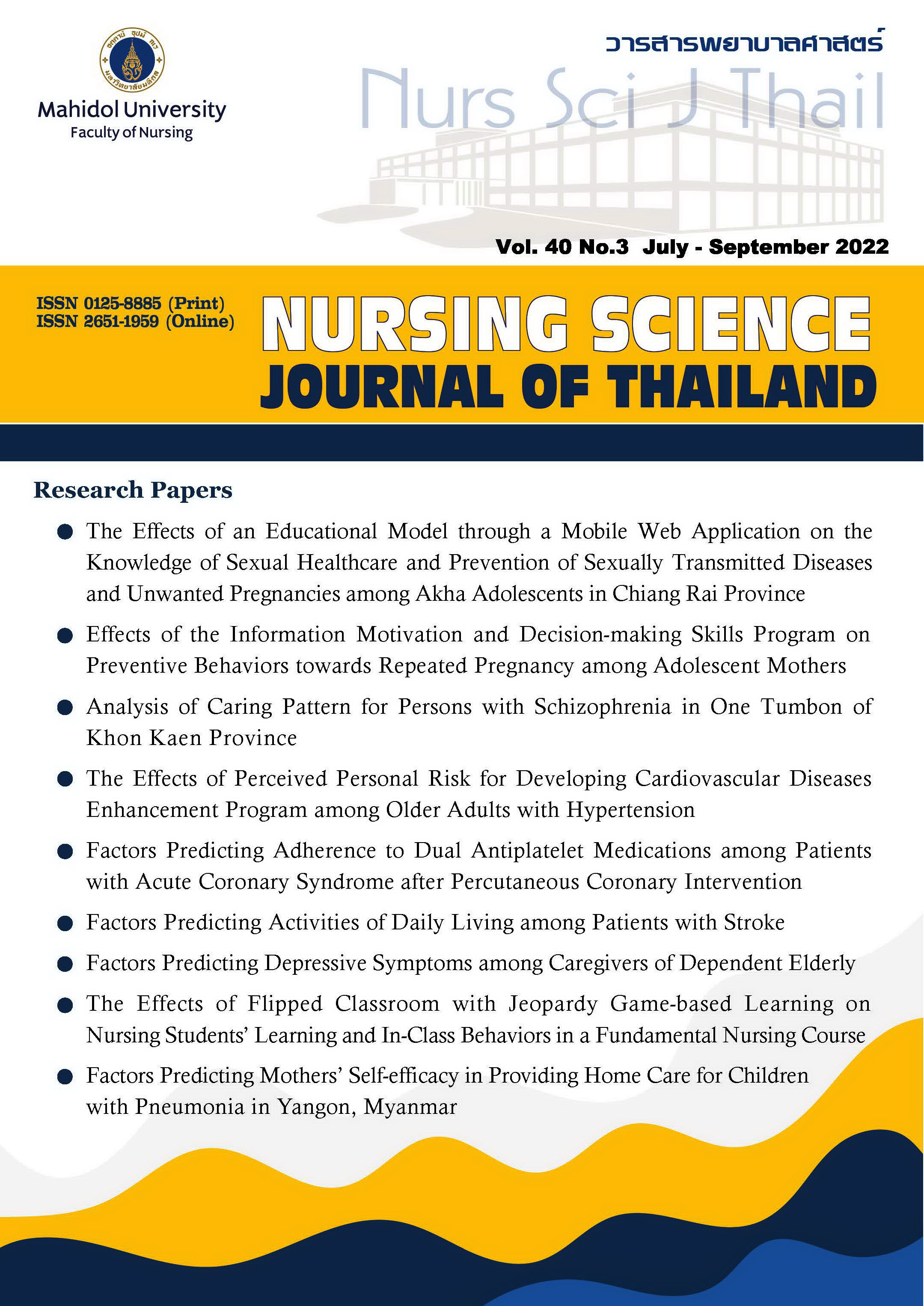Factors Predicting Depressive Symptoms among Caregivers of Dependent Elderly
Main Article Content
Abstract
Purpose: To investigate predicting factors of caregivers’ preparedness, caregiver role strain, and rewards of caregiving on depressive symptoms among caregivers of dependent elderly.
Design: Correlational predictive design.
Methods: Participants were 116 primary caregivers who had been taking care of dependent elderly receiving treatment at a tertiary hospital, Bangkok. Data were collected by using questionnaires including demographic data, caregivers’ preparedness, caregiver role strain, rewards of caregiving, and Center for Epidemiologic Studies-Depression scale. Descriptive statistics, Spearman rank correlation, and multiple regression analysis were employed to analyze data.
Main findings: The study findings revealed that most caregivers were female with an average age of 51.72 years and 75% were adult children of the dependent elderly. Depressive symptoms were found 18.1% in caregivers. The study factors including preparedness for family care, caregiver role strain, and reward of caregiving could together explain 45% of the variance of depressive symptoms among the caregivers (adjusted R2 = .45. The factors predicting depressive symptoms with statistical significance were role strain from economic burden ( = .31, t = 3.63, p < .001) and caregivers’ preparedness (
= - .30, t = -3.18, p = .002).
Conclusion and recommendations: The results suggest that nurses should assess caregivers’ preparedness and economic burden in caring for the dependent elderly. An intervention should be provided to reduce caregivers’ depressive symptoms so that they would be competent to care for the dependent elderly effectively.
Article Details

This work is licensed under a Creative Commons Attribution-NonCommercial-NoDerivatives 4.0 International License.
Copyright Notice: Nursing Science Journal of Thailand has exclusive rights to publish and distribute the manuscript and all contents therein. Without the journal’s permission, the dissemination of the manuscript in another journal or online, and the reproduction of the manuscript for non-educational purpose are prohibited.

Disclaimer: The opinion expressed and figures provided in this journal, NSJT, are the sole responsibility of the authors. The editorial board bears no responsibility in this regard.
References
Foundation of Thai Gerontology Research and Development Institute. Situation of the Thai elderly 2020 [Internet]. Bangkok: Foundation of Thai Gerontology Research and Development Institute; 2021 [cited 2021 Sep 25]. Available from: http://thaitgri.org/?wpdmpro. (in Thai).
National Health Security Office (NHSO). Manual management support long-term health care service system for the elderly with dependence on the national health insurance system. Bangkok: National Health Security Office; 2016. 86 p. (in Thai).
Sasat S. Gerontological nursing: common problems and caring guideline. 4th ed. Bangkok: CU Print; 2020. 332 p. (in Thai).
de Oliveira AMS, Pedreira LC. Being elderly with functional dependence and their family caregivers. Acta Paulista de Enfermagem. 2012;25 Special 1:143-9. doi: 10.1590/S0103-21002012000800022.
Sihapark S, Chuengsatiansup K, Tengrung K. The effects and caregiving burdens of older persons in long-term care based on Thai culture. Bangkok: Health Systems Research and Development Institute, Foundation of Thai Gerontology Research and Development Institute, Policy and Strategy Division, Ministry of Public Health; 2013. 198 p. (in Thai).
Kim D. Relationships between caregiving stress, depression, and self-esteem in family caregivers of adults with a disability. Occup Ther Int. 2017;2017:1686143. doi: 10.1155/2017/1686143.
Arican B, Guney M, Akbal N, Demiral BH, Nadir A, Kokar IK, et al. Determining depression level of caregivers providing home healthcare services. North Clin Istanb. 2016;3(2):118-23. doi: 10.14744/nci.2016.65487.
Del-Pino-Casado R, Palomino-Moral PA, Pastor-Bravo MDM, Frías-Osuna A. Determinants of depression in primary caregivers of disabled older relatives: a path analysis. BMC Geriatrics. 2017;17(1):274. doi: 10.1186/s12877-017-0667-1.
Chayawatto C. Depression in the caregivers of stroke patients. Region 4-5 Medical Journal. 2016;35(1):14-27. (in Thai).
Hiransaroj B, Wirojratana V, Vongsirimas N, Senanarong V. Factors influencing depressive symptoms in caregivers of older adults with dementia. Journal of Thailand Nursing and Midwifery Council. 2020;35(2):85-98. (in Thai).
Lamliangpon P. Anxiety-depression and quality of life in dementia caregivers. Journal of Mental Health of Thailand. 2015;23(2):112-24. (in Thai).
Wirojratana V. Development of the Thai family care inventory [dissertation]. Portland, OR: Oregon Health & Science University; 2002. 262 p.
Archbold PG, Stewart BJ, Greenlick MR, Harvath T. Mutuality and preparedness as predictors of caregiver role strain. Res Nurs Health. 1990;13(6):375-84. doi: 10.1002/nur.4770130605.
Lotus Shyu Y-I, Yang C-T, Huang C-C, Kuo H-C, Chen S-T, Hsu W-C. Influences of mutuality, preparedness, and balance on caregivers of patients with dementia. J Nurs Res. 2010;18(3):155-63. doi: 10.1097/JNR.0b013e3181ed5845.
Archbold PG, Stewart BJ, Harvath TA, Lucus SA. New measures of concepts central to and understanding of a caregiving [unpublished manuscript]. Portland, OR: Oregon Health & Sciences University; 1986. 35 p.
Quinn C, Toms G. Influence of positive aspects of dementia caregiving on caregivers' well-being: a systematic review. Gerontologist. 2019;59(5):e584-e96. doi: 10.1093/geront/gny168.
Henriksson A, Arestedt K. Exploring factors and caregiver outcomes associated with feelings of preparedness for caregiving in family caregivers in palliative care: a correlational, cross-sectional study. Palliat Med. 2013;27(7):639-46. doi: 10.1177/0269216313486954.
Polit DF, Beck CT. Nursing research: generating and assessing evidence for nursing practice. 10th ed. Philadelphia: Wolters Kluwer Health/Lippincott Williams & Wilkins; 2017. 814 p.
Jitapunkul S, Kamolratanakul P, Ebrahim S. The meaning of activities of daily living in a Thai elderly population: development of a new index. Age Ageing. 1994;23(2):97-101. doi: 10.1093/ageing/23.2.97.
Trongsakul S, Lambert R, Clark A, Wongpakaran N, Cross J. Development of the Thai version of Mini-Cog, a brief cognitive screening test. Geriatr Gerontol Int. 2015;15(5):594-600. doi: 10.1111/ggi.12318.
Kuptniratsaikul V, Pekuman P. The study of the Center for Epidemiologic Studies-Depression scale (CES-D) in Thai people. Siriraj Med J. 1997;49(5):442-8. (in Thai).
Hamtanon P. Factors related to positive aspects in caregiving patients with dementia: a study with family caregivers. The Southern Collage Network Journal of Nursing and Public Health. 2019;6(2):163-75. (in Thai).
Pakpakorn R, Kanchanatawan B, Charnnarong N. Prevalence and associated factors of depression in caregivers of patients with stroke at King Chulalongkorn Memorial Hospital. Chulalongkorn Medical Journal. 2015;59(4):457–69. (in Thai).
Lee HS, Kim C. Factors affecting family caregivers' burden and depression in home-based long-term care service under the long-term care insurance system. Journal of Korean Academy of Community Health Nursing. 2018;29(4):530-8. doi: 10.12799/jkachn.2018.29.4.530.


